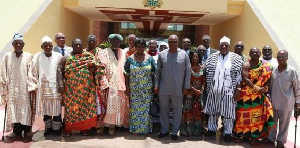- Home - News
- TWI News | TV
- Polls
- Year In Review
- News Archive
- Crime & Punishment
- Politics
- Regional
- Editorial
- Health
- Ghanaians Abroad
- Tabloid
- Africa
- Religion
- Election 2020
- Coronavirus
- News Videos | TV
- Photo Archives
- News Headlines
- Press Release
Opinions of Friday, 2 September 2016
Columnist: Kwame Gyasi
Council Of State should be scrapped (1)
By Kwame Gyasi
“! (2) This Constitution shall be the supreme law of Ghana and any other law found to be inconsistent with any provision of this Constitution shall, to the extent of the inconsistency, be void”.
—Chapter One of the Ghanaian Constitution
The Constitution of every country is seen as the supreme law of that country, and as such must be considered sacred and then sacrosanct subject to periodic amendments. A constitution is also not just a legal document but also possesses very serious economic attributes and financial implications.
It is partly in recognition of this fact that virtually most legislations, which have financial encumbrances, have been made the prerogative of the presidency since those legislations are seen to have financial implications for the nation’s consolidated fund.
Governance is expensive, and democracy seen as the best unavoidable form of governance everywhere is indeed expensive, not the least, constitutional democracy. In actual fact there is no way a constitutional democracy can be made cheap. Like boxing, which cannot be made safe, but however can be made safer, constitutional democracy can also be made cheaper if not cheap.
Under the constitution, three axis of power are created. These are the executive, the legislature and the judiciary. In theory, these kingpins are supposed to act as checks and balances on each other.
In practice, it has been a different ball game. It would appear to some keen political observers and democracy watchers that there has been serious failings in the functioning of the three arms of governance. Indications point to the fact that in appearance and on some occasions, the judiciary as exemplified by the judgment of some justices, and the legislature in particular judging from parliamentary debates and votings, did chicken out to the whims and caprices of the executive.
Indeed the judgment of the Supreme Court in the election petition brought by the NPP against the election of John Dramani Mahama did a lot of damage to the image and reputation of the Supreme Court in the eyes of many right thinking citizens.
Parliament currently stands completely disgraced as an institution established to police the executive due to lack of intellectual and patriotic characteristics of many of the members who fail to see events in independent and nationalistic manner and rather approach issues of national interest with narrow myopic partisan political consideration.
All these facts should not sound surprising to any keen observer of the political scene. The truth of the matter is that the Constitution has created a super executive with immense powers of political, economic, financial and judicial patronage and wide range of prerogative of mercy.
The powers given to the executive are so frightening that only a sensible, level headed, mature, patriotic, intellectual, pragmatic and accommodating attitude and approach to this power base by an incumbent executive devoid of partisan considerations can ensure the survival of our democracy.
One frighten aspect of this power game is the executive’s ability to incur cost on behalf of the state and as has been recently witnessed, the power of the prerogative of mercy.
Chapter 8 of the Constitution: “The Executive” establishes the framework of power. Article 57 of the chapter creates the artificial almighty called “The President of Ghana”. Clause 1 of article 57 of the Constitution states:
“There shall be a President of the Republic of Ghana who shall be the Head of State and Head of Government and Commander-in-Chief of the Armed Forces of Ghana”, while clause 2 of the same article states in part: “The President shall take precedence over all other persons in Ghana…”
The Constitution makes the President the power base of the Executive as stated in article 58(1): “The executive authority of Ghana shall vest in the President and shall be exercised in accordance with the provision of this Constitution”.
One very obvious area where the executive powers vested in the President have been made so sumptuous and very tempting to the extent that it is subject to sacrilegious abuse is in article 70 which deals with appointments by the President. Virtually all political, civil and public appointees from chief executive positions to messengers hold office by the mercy of the President.
Linked to this power of appointments by the President is the creation of the Council of State. The importance of this body is seen in the order of its appearance in the Constitution. While chapter 8 deals with the Executive, chapters 9, 10 and 11 deal with the Council of State, the Legislature and the Judiciary respectively.
Under article 70 titled: “Appointments by President”, while the appointments by the President of the Chairman, Deputy Chairmen and other members of the Electoral Commission are done on the ADVICE (emphasis mine) of the Council of State, the other appointments stated in the article are done in CONSULTATION(emphasis mine) with the Council of State.
According to a legal luminary, the two emphasized words are all matters of semantics and mean the same.
The Constitution gives so much powers to the President to make so many appointments, some on the advice and some in consultation with the Council of State. Some of these appointments must go to Parliament for approval. There are other appointments too numerous to mention that are made on the quiet by the President and by his other political appointees like those made by cabinet ministers and District Chief Executives which do not come out openly.
Very often one hears of political appointees like National Security Adviser, Special Assistant, Deputy Government Spokesman and others without any indications as to when and from where such appointments were made and how many of such appointees actually exist.
The reality of the situation is that almost invariably, these appointments are made to satisfy political patronage. They are made to the people who might have contributed either by brain, brawn or finance or in current currency, the volume of insults heaped on perceived political opponents and some other means to the success of the President’s party and person.
Some of the appointments are made to people deemed to be loyal to the President such as family members, professional associates, cronies, ethnic lines, fellow old students and others considered very close to the President and who share his aspirations. Simply put, a lot of these appointments are “thank you” gestures. The dangers in these appointments are real.
In this part of our world, most of these executive appointments are made with little or no regard to the fact that such appointees must of necessity bring top quality to such positions. Competence, integrity and loyalty should be weighed in that order.
Sadly enough, very often the weighing is reversed. The nation loses double. Good money which could have gone to provide boreholes to some needy villages are used to pay for inefficiency, indiscipline, corruption and bankrupt management and sometimes plain buffoonery.
During the past few weeks, one aspect of the misuse of the frightening enormous powers of the President under the Constitution has been witnessed, the spurious, frivolous, garrulous and unlawful use of the Constitution by John Dramani Mahama to free the Montie 3 from lawful incarceration for contempt of the Supreme Court.
These self-confessed criminals who under civilised jurisdictions should be rotting in a Guantanamo Bay style prison are today under a misused presidential prerogative of mercy, freely walking the streets and addressing political rallies as heroes to the uncouth and under the guise of an evil political establishment.
The Montie 3 were reportedly unlawfully freed by John Dramani Mahama supposedly acting on the advice of the Council of State clearly to politically please and placate a captive corrupt political constituency and to dastardly rebuke the sensitivity of the nation regardless of the serious implication for the health of the nation.
By its involvement in the Montie 3 episode, the Council of State has demonstrated beyond all reasonable doubt its long held public image as an over-pampered parasitic constitutional body composed of spoilt aged politically favoured individuals feeding fat on the national exchequer with secret budget not exposed to the public and with no defined responsibility and accountability levels.
Evil tongues rumour that the members enjoy facilities and packages which even the exalted members of House of Lords of the British parliamentary system should find envious. The Council of State serves no useful purpose to the citizen, adds no value to our democratic dispensation and is a complete waste pipe on the national budget and should be scrapped immediately to save the nation from further needless financial losses and heartbreaks.
To be told that some members of the Council of State were signatories to the petition to free the Montie 3 is not only abominable but also sacrilegious. For a member of the Council of State to dare anybody aggrieved by the pardon to go to court shows the lack of intellect in understanding the gross implications of the foolish nature and the serious legal ramifications of the whole act of the pardon. Some advisers indeed!!!
Writer's e-mail:E-mail: makgyasi@ug.edu.gh











